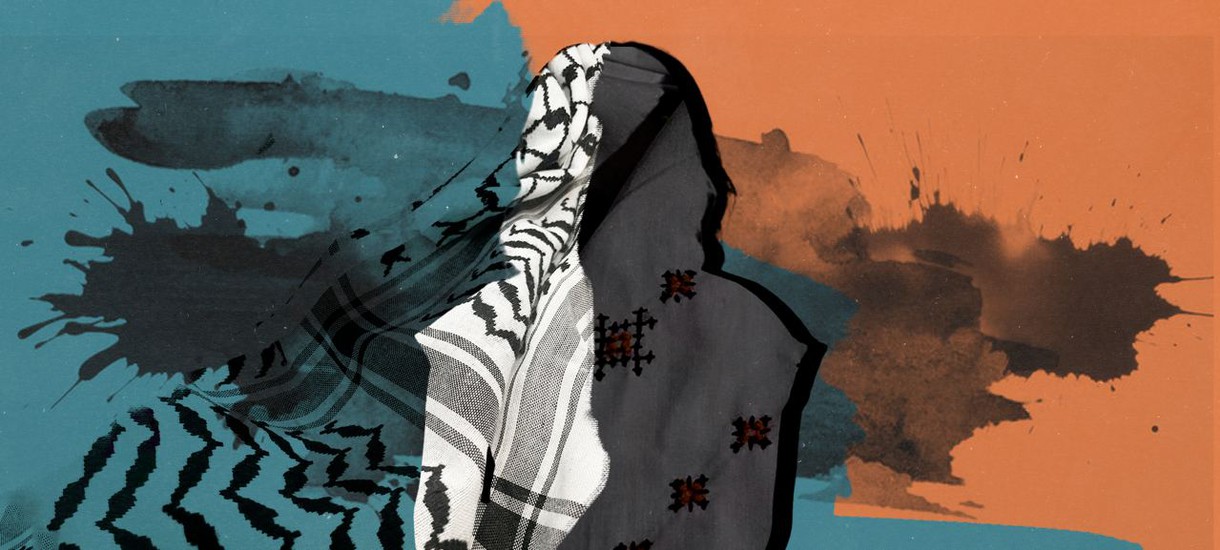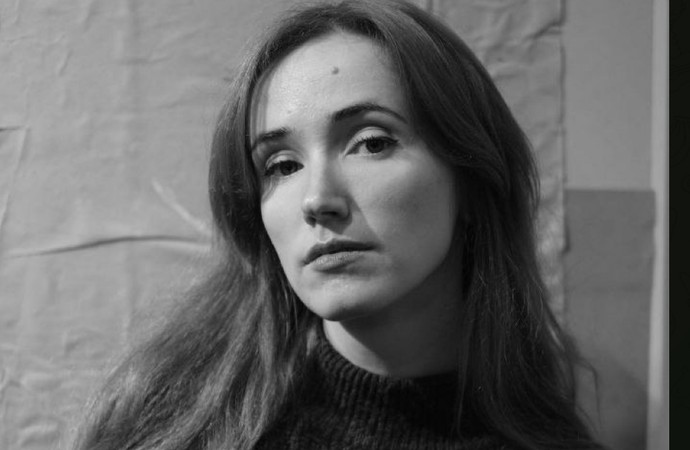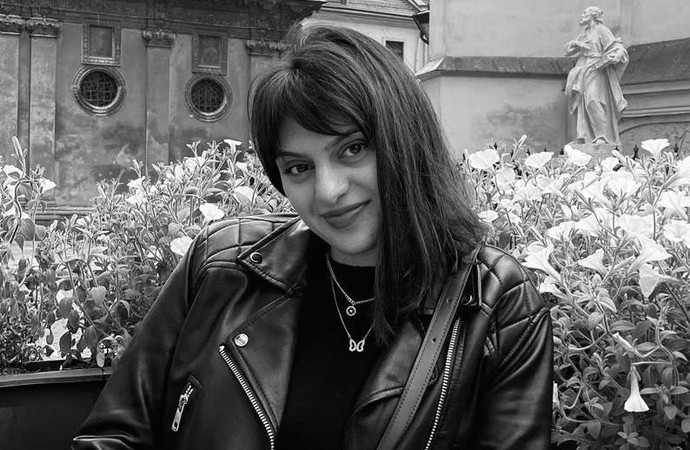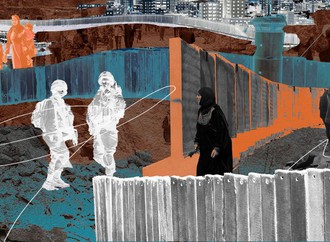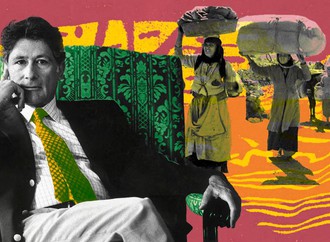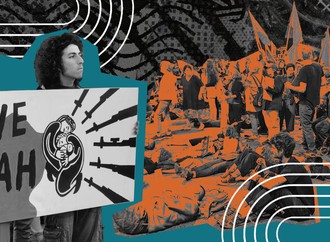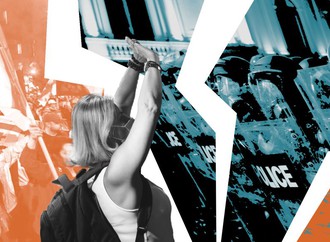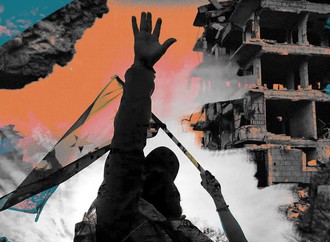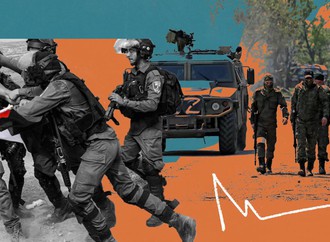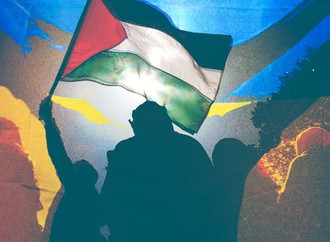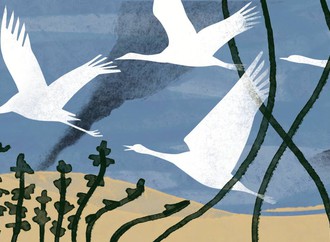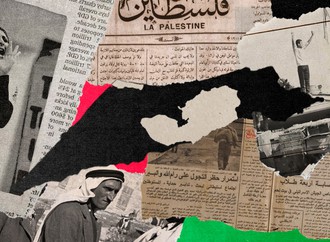Since October 7th, there have been a number of interviews and articles regarding Israelis of Ukrainian descent. However, the voices of Ukrainians of Palestinian descent are noticeably absent from the dominant Ukrainian news.
We spoke with Rita Adel about her ongoing effort to navigate trauma and obstacles on both sides of her family. With the start of the full-scale invasion, Rita started to reflect on her positionality as both of Ukrainian and Palestinian origins. She actively advocates for arming Ukraine and boycotting Israel and addresses double standards concerning Ukraine and Palestine. With her activism, Rita Adel establishes sustainable networks of solidarity between her homelands.
What are your ties to Ukraine and Palestine?
I am both Ukrainian and Jordanian of Palestinian origin. My mom is from Ukraine and my dad is a Palestinian-Jordanian. And there are a lot of people like me that come from this particular mix of heritage because many people studied in the former USSR. This is how my parents met. So I was born and raised in Ukraine, and then we moved to Jordan in 2003: I remember this date very well because it was the year when there was war in Iraq. So basically, both countries are my homeland. But all my childhood memories and growing up are related to Ukraine - it's my home.
Your father was displaced from Palestine and was already born in Jordan. Did your family go through the Nakba or Naksa, and how exactly did your father come to Ukraine?
My dad of Palestinian origin was already born in Jordan like thousands of Palestinians who were displaced from Palestine. It was a result of Naksa which was a continuation of what we call Nakba, the creation of Israel in 1948. The Israeli state was created at the expense of Palestinians, on its possession of Palestinian land. We're talking about over 80% of the population displaced. We're talking about approximately 750,000 Palestinians displaced at the time, expelled from their homes, becoming refugees. So this is how my father, like many others, was born in Jordan.
Growing up, I've never heard any other rhetoric about Palestinians in the mainstream media besides them being terrorists, attacking Israel for no reason.
But both of my grandparents from my dad's side were Palestinians born and raised in Palestine. It's so funny that when I visited Palestine - a couple of times, the West Bank in particular - I was only able to do this because I have a Ukrainian passport. People of Palestinian origin can visit, but they need to apply for a visa, etc. It's a lengthy process and sometimes you get a rejection.
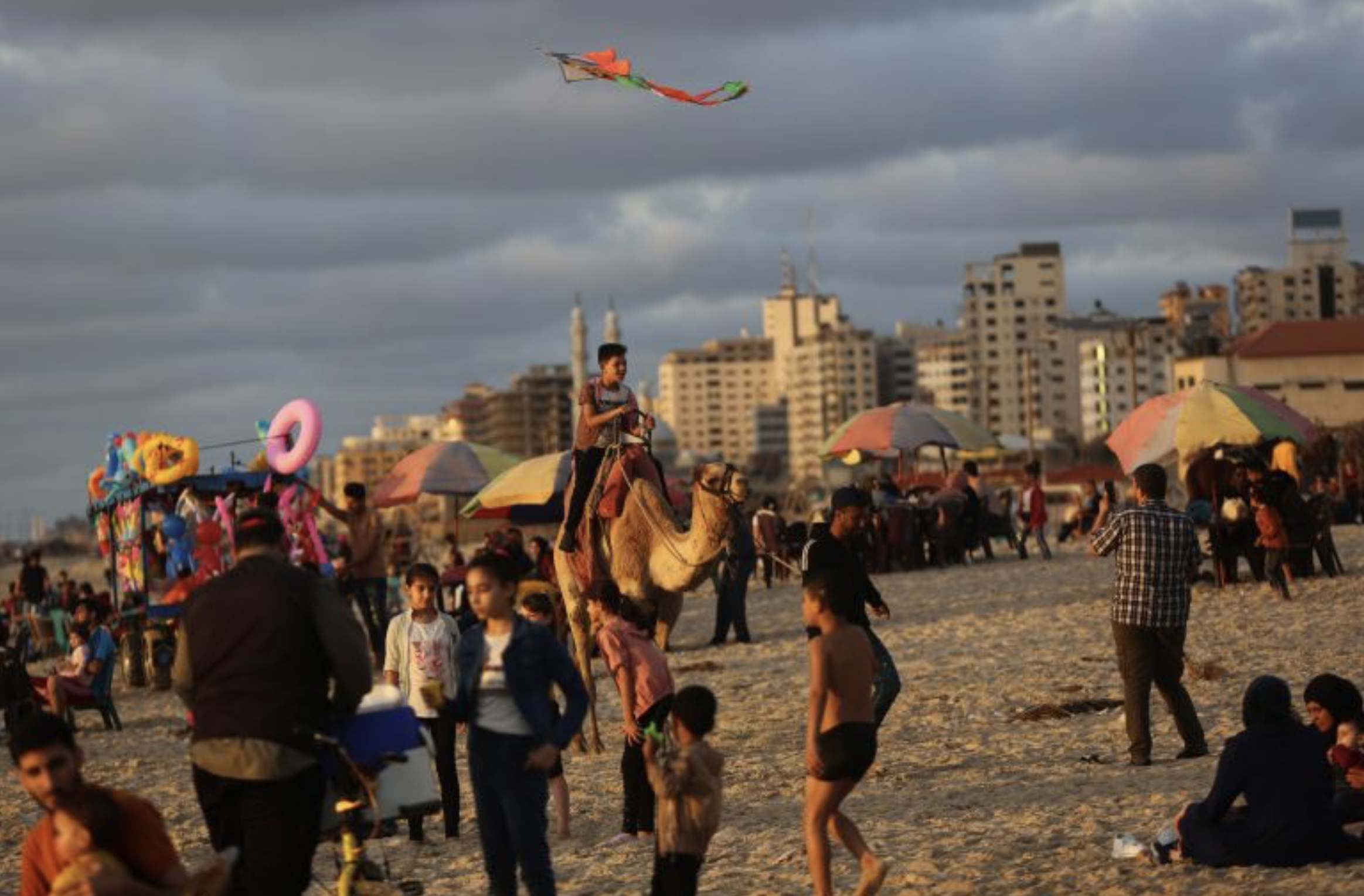
Palestinians are resting on a beach in Gaza, August 2023. Photo: Abdelhakim Abu Riash / Al Jazeera
Growing up as a Palestinian and Ukrainian in Ukraine, what was it like for you? Do you recall some of your childhood memories?
My memories associated with Ukraine were the best, these were the formative years of my life. Ukraine was always a happy place, and to be honest, I had such an amazing childhood. I can't recall any instances of racism or whatsoever. I just always understood that I was a little bit darker than most of my friends, but that was never an issue, especially in big cities. My mom comes from a village in Poltava Oblast, and it was a bit different there. But again, it wasn't much about racism, it was more about curiosity. People would sometimes ask me things about Jordan, like funny questions: do you have potatoes in Jordan? Do you have onions like we have in Ukraine? But generally, I had very happy memories growing up in Ukraine. I am forever grateful to my hometown for having such an amazing childhood.
Being both of Palestinian and of Ukrainian origin, how do you feel with the mainstream rhetoric about Palestine and Ukraine?
One of the big issues in Ukraine is that people in Ukraine generally know very little about Palestine and Palestinians. And mainly that is because of the way mainstream media operates, being very much impacted by the Israeli narrative: this is the only narrative that we can hear from the mainstream media. I've never heard anything else.
Growing up, I've never heard any other rhetoric about Palestinians in the mainstream media besides them being terrorists, attacking Israel for no reason, and so on and so forth. So the knowledge is wearying, to be honest.
What about Ukrainians in Palestinian-Jordanian context?
There are a lot of mixed marriages between Arabs and Ukrainians. This is mainly because many students, like my dad, came to the former USSR to study.
Education was one of the means through which the Soviet Union expanded its influence in the Southern Hemisphere. They invested a lot of resources in bringing people from the Southern Hemisphere to the USSR: students from Arab and African countries, and Latin America. In terms of Arab countries, there was significant Soviet-Arab educational and cultural cooperation, primarily Iraqi-Soviet and Soviet-Jordanian cooperation. This wave of education and cooperation peaked during the 1950s to the 1970s.
This coincided with the broader Arab aspirations toward self-determination. During this time, ideas such as pan-Arabism and anti-imperialism were very popular in the Arab region. In Egypt, this era saw the rise of pan-Nasserism and significant events like the nationalization of the Suez Canal.
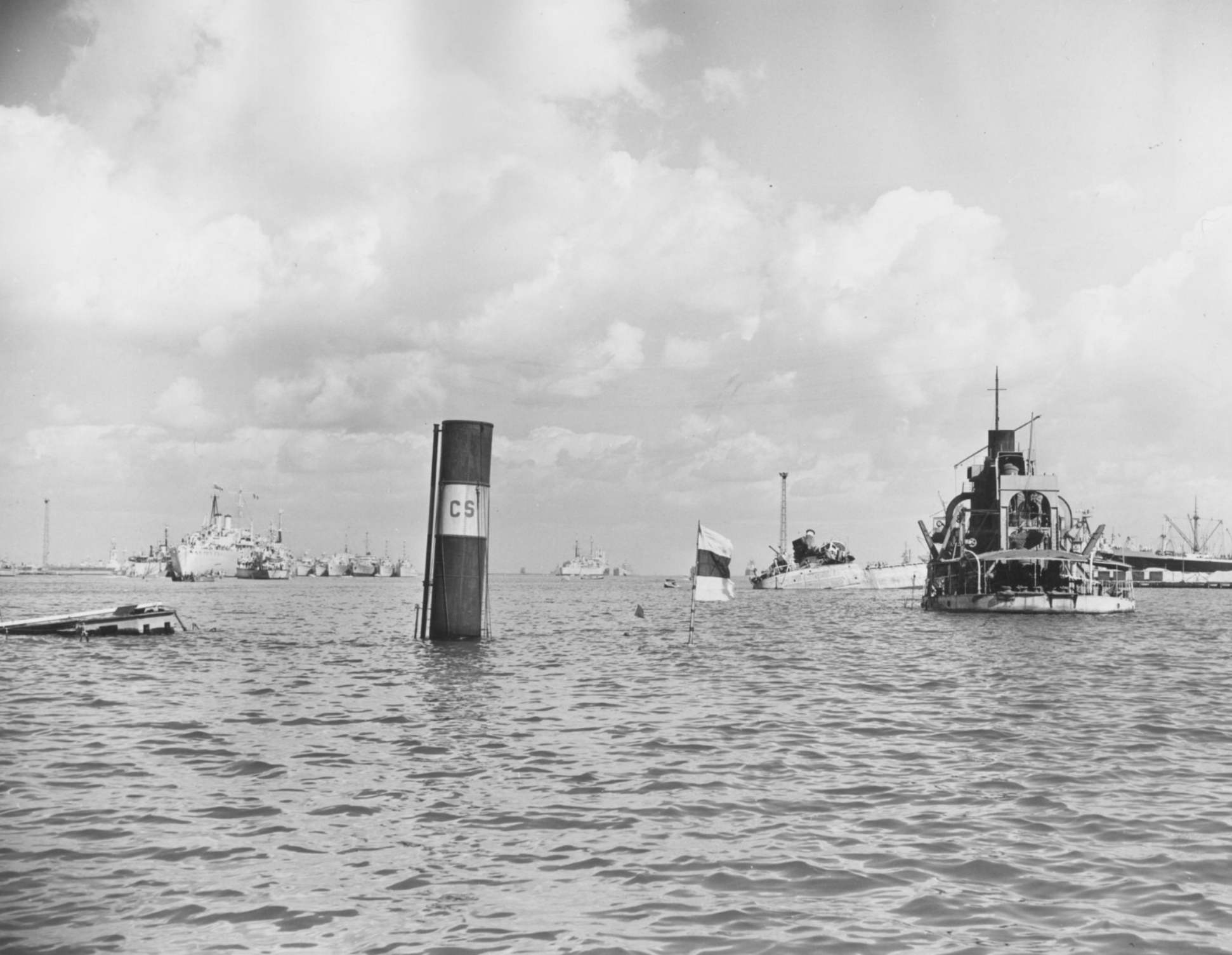
Suez Canal is blocked, November 12, 1956. Photo: from open sources
Inspired by pan-Arabism, Arab states needed more resources, specifically skills and knowledge, to achieve their independence goals. The Soviet Union was instrumental in helping them. For example, the Soviet Union played a crucial role in the nationalization of the Suez Canal. Similarly, it aided the Iraqi government in nationalizing its oil sector, among other instances. Arab states realized they were heavily reliant on Western expertise and sought assistance from the USSR to help train and develop their local capacities. This is why there was so much cooperation between the Arab world and the former Soviet Union in terms of education.
And of course, this cooperation was not limited to socialist countries like Egypt and Iraq in the 1970s. Other countries in the region, such as Jordan, were also involved. For instance, my father pursued his education in the Soviet Union. After completing their studies, many chose to stay, marry locals, and start families, resulting in a significant number of mixed-heritage children like myself. This explains why there are so many Arabs living in Ukraine today. After the fall of the Soviet Union, many of these individuals continued to reside in Ukraine, maintaining the strong ties that were established.
There are so many Ukrainian women who married Palestinian men, that the Ukrainian community constitutes the largest migrant population in Gaza!
Unfortunately, it was mostly men who enjoyed this kind of mobility, while less women had an opportunity to be educated in the USSR due to limited social mobility dictated by strict gender norms.
Intermarriages between Arabs and Ukranians was and continues to be a massive social phenomenon. There are so many Ukrainian women who married Palestinian men, that the Ukrainian community constitutes the largest migrant population in Gaza! Similarly, many women, like my mother, married Jordanians and now live in Jordan.
In Jordan as an example, before the war in Ukraine, women from the former Soviet Union, within the Russian-speaking community, usually had groups for socializing and supporting each other. These included Ukrainians, Russians, Belarusians, and people from Kazakhstan. As the war started of course, these groups had internal divisions between those who supported or opposed the war, which effectively ended any kind of socialization between Ukranians and those who started speaking in favor of the war.
Do you recall the first day of the Russian invasion of Ukraine? Where were you? How was it for you?
I remember it vividly. I happened to be in Jordan at the time. Interestingly, just one month before the invasion, I was in Ukraine: I left Ukraine on January 24th, and the war began on February 24th. I recall the moment distinctly.
When the war started, I initially couldn't believe it. I remember waking up to my mom telling me the news. I even remember that I had to switch on the news before I could believe what my family was telling me. I was in denial for a couple of days; it felt like a bad dream. It took me some time, maybe a few weeks, to fully process what was happening.
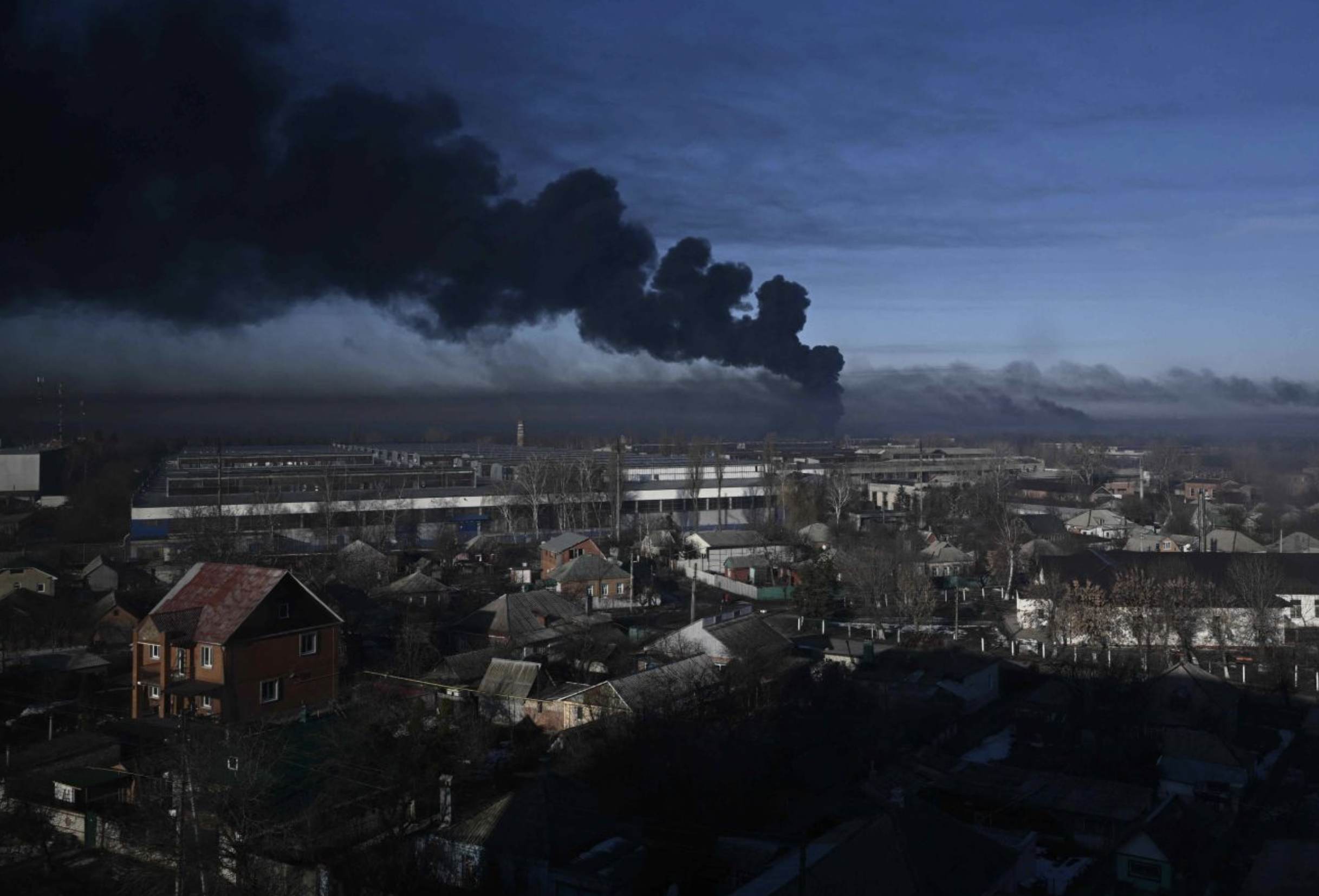
Chuhuiv city in the Kharkiv region, shelled on February 24 by the Russian military. Photo: Aris Messinis / AFP
For years, we've been splitting our time between Ukraine and Jordan, with my dad and brother primarily based in Ukraine due to work. When the war started, by pure luck my immediate family happened to be in Jordan. I was more lucky than so many people: I was safe and my family was safe. But of course, I was very worried about my relatives and friends in Ukraine. Like most Ukrainians, we didn't sleep for the first couple of weeks. We didn't know what was happening. My brother's wife was in Ukraine at the time: she had to leave Kyiv and travel for a couple of days to Germany. I remember my brother didn't sleep all of that time. There was a lot of fear involved because I remember what Russia did in Syria. I was expecting the worst scenarios because I knew what we were dealing with.
During the first few weeks of the war, I remember there were rumors that Russia might encircle Kyiv, trying to impose a siege on the city. It fortunately did not come true, but I was so worried about that specific thing, that was the thing that I feared the most. I didn't know why, but for me, anything that has to do with famine, is such a terrible, huge fear.
Many Ukrainians have trauma related to the Holodomor. Growing up Ukrainian, especially in the village, I saw this firsthand: one of the things my grandparents were always concerned about was having enough food. We always made sure to have plenty and stored food as part of our cultural practices, like conservation and preservation. So, when I heard those rumors about Kyiv, it brought back that deep-seated fear. Though it didn't happen [in 2022], the thought of a siege and potential famine was overwhelmingly frightening for me.
And this is what's happening in Palestine now. Gaza is on the verge of famine, and being Ukrainian, recalling the stories of my grandparents, and my great-grandmother who went through Holodomor, it was one of the major fears that I had about Ukraine. While it did not happen in the Kyiv region, it happened in Mariupol, and unfortunately, it is happening in Gaza now.
After October 7th, I felt so dissociated. First time in my life, I was happy that I am not in Ukraine, I was happy that I'm not in Kyiv, that I don't see the city in all the Israeli flags.
Could you tell us more about how your circles reacted to the news of war first in Ukraine then in Gaza?
Ukrainians don't know much about Palestine, but knowing that I am Arab and Palestinian, people are careful about what they say in front of me. I remember having this conversation with a very close friend in Ukraine, when the Russian invasion of Ukraine started. She asked me about the lack of Arab support for Ukraine. Generally speaking, people in the Arab world do have compassion for Ukrainians, but the heavy involvement of the US complicates things. Personally, I felt discouraged and betrayed by so many people who knew me well, but did not reach out to ask about me or my family when the full-scale invasion of Ukraine took place.
Similarly I was disappointed, but not surprised by the reaction of the majority in Ukraine after October 7th. Interestingly, after the full-scale invasion started I felt guilty for not being in Ukraine, for being safe. I wanted to return to Ukraine when the war started. It doesn't make sense, but it was like this for many Ukrainians: they felt guilty, and they wanted to be part of what's happening in Ukraine, they wanted to act. But after October 7th, I felt so dissociated. First time in my life, I was happy that I am not in Ukraine, I was happy that I'm not in Kyiv, that I don't see the city in all the Israeli flags. I had this conversation with my brother and he actually felt the same. I felt foreign in my own country. It was a very terrible feeling. And still, after all those years, people, my friends would ask me, oh, what about Palestinians? Palestinians did this, they did that, they did other things - people say this without actually knowing anything about Palestinians.
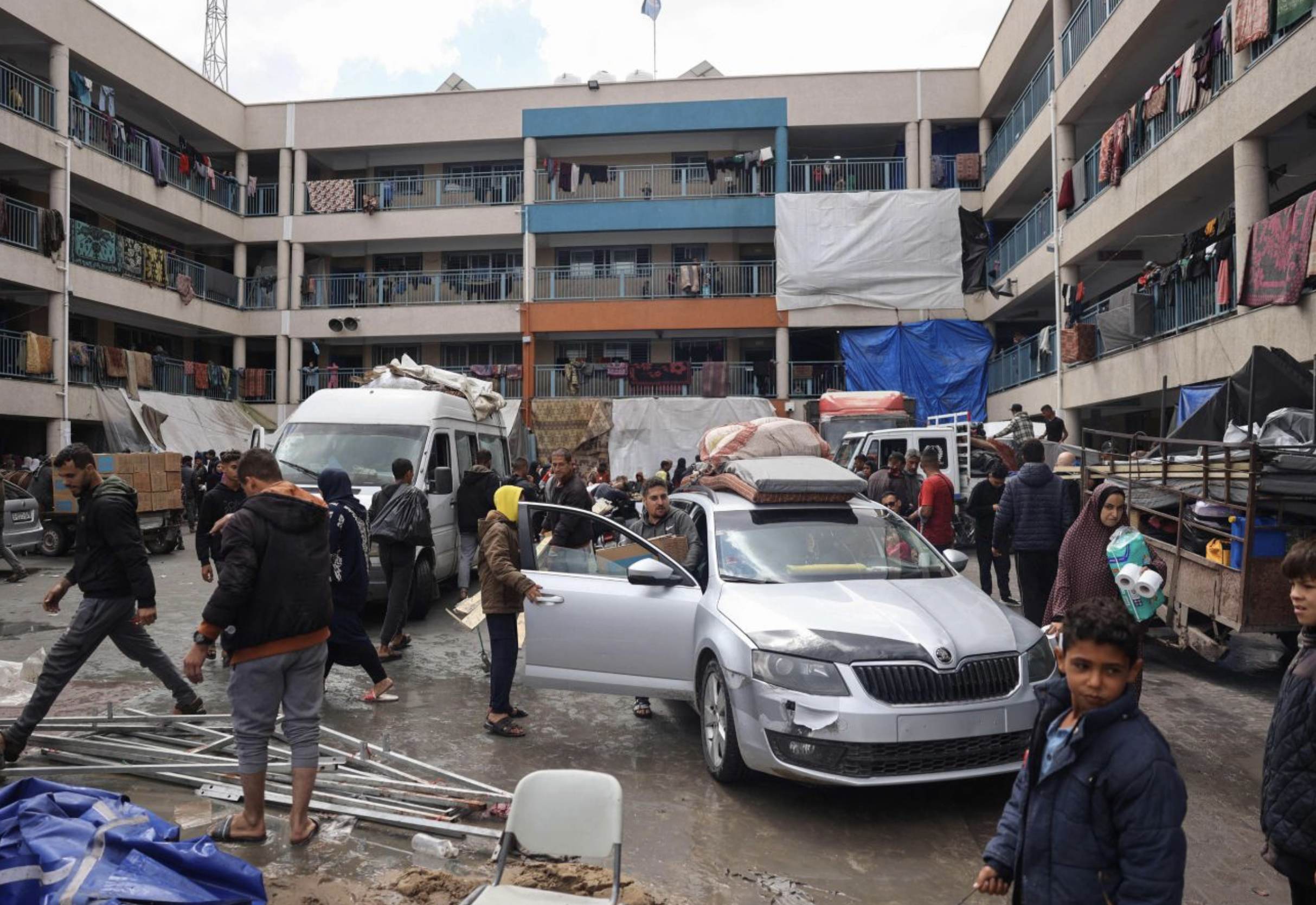
Palestinian refugees in the city of Rafah after the announcement of the evacuation, May 6, 2024. Photo: AFP
We see many examples of the collective so-called global South solidarity with Palestinians, for example, South Africa's case against Israel. And Ukraine is actually overwhelmingly missing from this conversation.
One of the major reasons why Ukraine is missing from this conversation is that Ukraine is trying very hard to associate itself with Europe, with all the social implications that follow. For more than a decade now, and especially after the Maidan revolution, Ukraine has been trying to associate itself with the European Union. It invented itself as a nation, and as being part of the Western world, as opposed to being part of the post-Soviet space, or as opposed to being part of the “Asian world.” The slogan "Ukraine is Europe” has become the dominant narrative, emphasizing the so-called “European values” and “European civilization”. Since the start of the war, this narrative has grown even more prevalent.
A lot of people in Ukraine don't understand that being anti-imperialist, and at the same time Eurocentric - it is not a coherent stand.
At the same time, there is a strong narrative of Ukraine fighting an anti-imperial war, a war for national liberation. And a lot of people in Ukraine don't understand that being anti-imperialist, and at the same time Eurocentric - it is not a coherent stand. This inconsistency is especially evident when addressing audiences from the Global South, a term I don't prefer but use here for convenience. The Global South has historically been on the receiving end of Western colonial violence. This fact is often missing from the mainstream Ukrainian narratives. This emphasis on the so-called “European values” makes it challenging for people from the Global South to sympathize with Ukraine. We can notice that in this narrative, the Russians, excluded from the civilized world, are being increasingly portrayed as ‘Asian’. This creates a dichotomy between being civilized, European, and Eurocentric, and on the opposing side, being Asian.
With this vision in mind, for many Ukrainians, Israel represents a democratic, European project in the Middle East, surrounded by Arab "barbarians" who supposedly want Israel to cease to exist. As a result, Ukraine is more closely associating itself with Israel than with Palestine in this narrative. Many people, including Zelensky, and a significant number of people on Twitter, frequently quote Golda Meir, an Israeli MP born in Kyiv, who famously said something like: "We want to live and our neighbors want us to die." This quote has become one of her most well-known statements, and Ukrainians often cite it as evidence of the similarities between Israel and Ukraine.
Since the start of the war, Ukraine has been extensively discussing the war crimes committed by Russia in Ukraine. We have been vocal about our desire to take Russia to the International Criminal Court (ICC). Meanwhile, in Ukraine, there is a lack of understanding that Israel is also committing war crimes and should be held accountable. I have never heard of any significant discussions in local news about South Africa taking Israel to the International Court of Justice. This silence is discouraging, because if people genuinely want to see Russia held accountable for its crimes in Ukraine, they must also acknowledge that Israel has to be held accountable for its own crimes. Recently, Zelensky made one comment about Israeli accountability, however the dominant narrative remains unchanged.
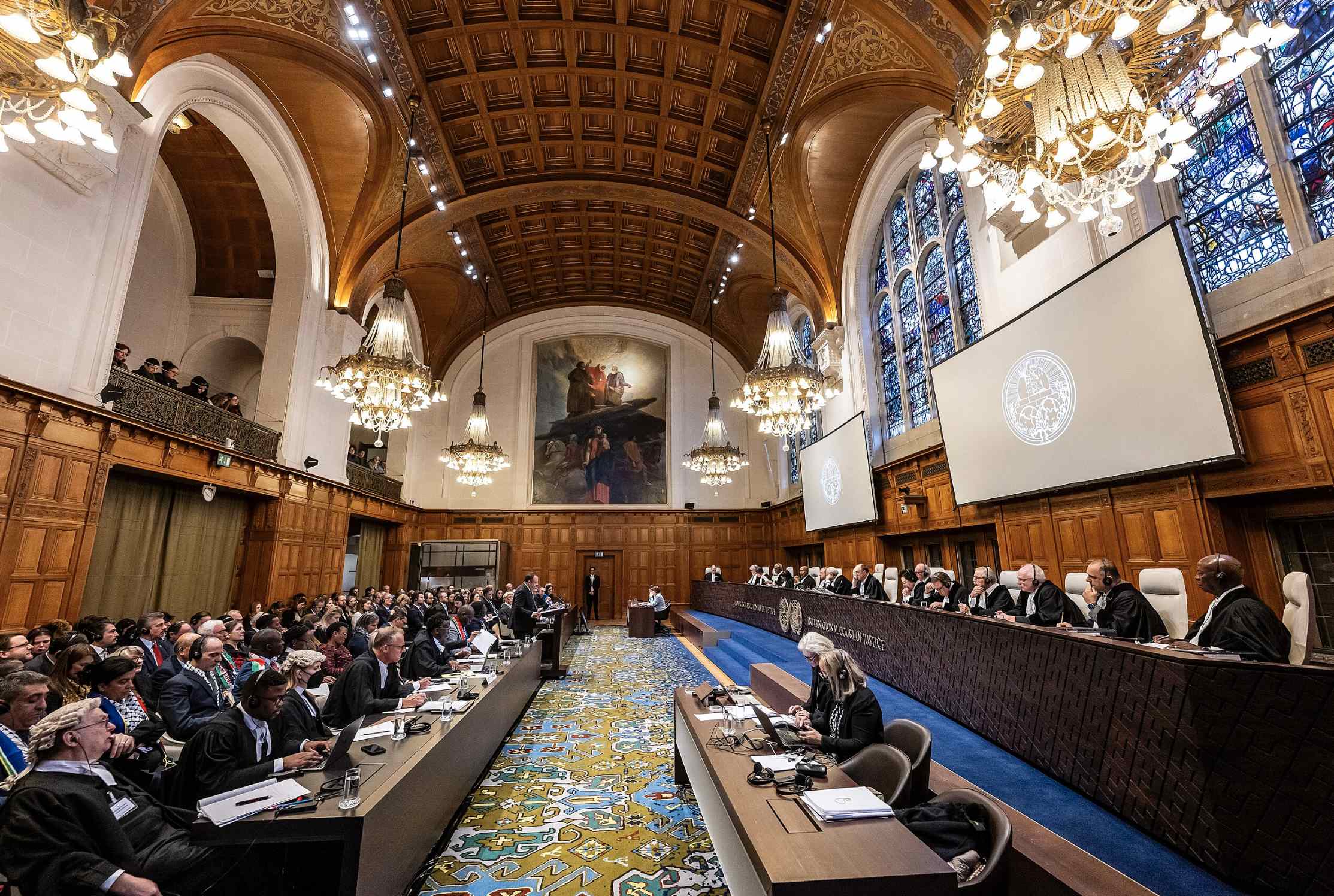
South Africa's Genocide Case against Israel at the UN International Court of Justice, The Hague, 12 January 2024. Photo: UN International Court of Justice
Unfortunately, I lost hope in mainstream media for many reasons. But the biggest surprise came from Twitter and from many Ukrainians who identified as progressive, anti-imperialist, etc. What was surprising wasn't that they did not sympathize with Palestine; rather, they sympathized with Israel - a stark example of double standards. I remember that since the start of the war and up until now, among Ukrainians on Twitter, there has been a recurring discussion: are Ukrainians allowed to hate Russians? The answer, of course, is that you're allowed to hate your oppressor. This same empathy was not extended to Palestinians. However, when Palestinians express hatred towards their oppressors, they're often labeled as terrorists or subjected to moralistic attacks.
Western media has been a blatant example of double standards, which was very evident by how it covered the war in Ukraine and the war in Gaza. Can you speak of this?
I believe that this is an important question that we need to confront, not because of campism, or for the sake of trying to compare who suffers more, but because we need to understand why there is such a massive amount of double standards. We need to comprehend why Palestinians are so marginalized and belittled. We need to understand why Arabs are so frustrated by these double standards, to the point where they have lost the ability to sympathize with Ukraine, and are filled with negative emotions towards Ukrainians.
However, what the Arab audiences largely miss is that Ukrainians are fighting to defend their homeland, just like Palestinins do, and no one goes to war solely to protect U.S. geopolitical interests.
Some people argue that we shouldn't discuss this and that it's unnecessary to compare the suffering of the two peoples. In my opinion, we do need to have this conversation in order to grasp the frustrations that arise from this perspective. The Arab world, in general, has a right to be annoyed by the double standards: how Western media portrays war in Ukraine versus how they portray war in Palestine. Ukrainians are portrayed as heroes defending their homeland, while Palestinians are depicted as terrorists.
This is mainly because at this historical point, The U.S. has a geopolitical interest in Ukraine, and as a result, everything Ukraine does is portrayed as heroic. However, what the Arab audiences largely miss is that Ukrainians are fighting to defend their homeland, just like Palestinins do, and no one goes to war solely to protect U.S. geopolitical interests. People go to war because they want to protect their land, their loved ones, and their way of life.
Ukranians too, need to be wary and realistic about Europe and the limits of this “European solidarity”. Let's look at Poland, for example, and what they're doing with Ukrainian grain. Let's also examine what Lithuania is doing with Ukrainian grain, and how they're handling their borders, and so on. So, Ukrainians need to understand that being part of the European family is a nice promise, but is it ever going to happen? And they also need to understand that whenever the economic interests of European countries are at stake, they will disregard their sympathy and empathy for Ukrainians.

Activists on the Independence Square, November 2013. Photo: from open sources
If you compare the narratives of those that circulated about refugees from the Global South and from Ukraine, the media would again be guilty of double standards. For Ukrainian refugees, it's easier to integrate in Europe, at least superficially, because they don't visibly stand out as different. However, many people in the Arab world also don't understand that Ukraine and Eastern Europe, in general, are not privileged regions. We don't come with a full package of being Western European, even while technically being “white”.
The claim "Ukrainians are white, therefore are privileged" is unfortunately quite common in some circles, but it is a superficial statement that does not, even remotely, reflect the reality of life in Ukraine.
Even before the war, Ukrainians were providing cheap labor to countries such as the United Kingdom, France, Germany, and especially Poland. In 2018 alone, the Polish government issued about 1.8 million temporary work permits to Ukrainians. Most Ukrainians working in Poland were employed outside their qualifications, merely filling the gap in the Polish labor market. Ukranians were facing a lot of racism, xenophobia, anti-immigration rhetoric, etc. Of course, this anti-immigration rhetoric was mostly directed at Muslim population, but Ukrainians were also impacted by that kind of racism. This is why I find it annoying when people start making assumptions based on superficial observations about privilege and ethnicity, and this is what a lot of people in the Global South and the Arab world don't understand about Ukraine.
Yes, I agree with you, and the situation changed after the war, but also it did not change, because Poland still almost entirely relies on Ukrainian cheap labour now, and so do many other countries.
I also wanted to ask you about BDS (Boycott, Divestment, Sanction), and I know that not many Ukrainians know that Palestine has this very well-developed movement in relation to sanctioning and boycotting Israeli products.
The Boycott, Divestment, and Sanctions (BDS) movement is a global phenomenon that aims to boycott Israeli products, events, and services. It's similar to the situation in Ukraine during the war, where people refused to welcome Russian involvement. So, I think it's very important for Ukrainians and Palestinians to learn from each other and see how the BDS movement is working, not just in Palestine but worldwide. For example, in the UK, it's a very powerful movement.
Ukrainians, however, are not familiar with the BDS movement due to limited exposure to international news sources and language barriers.
My next question is about the narratives about current genocide in Gaza. There are so many narratives about children and women in Gaza who are suffering, and not that many about men, their lives are often perceived as non grievable. It's quite common to many contexts actually, but it's very acute and apparent in the recent genocide. What can you say about this gender dynamics of the current genocide?
It's very common to discuss women and children because they're considered vulnerable, but this narrative is often seen as apolitical. If you want to avoid discussing politics and still talk about how the war is terrible, you often find yourself discussing the suffering of women and children. This is because when we talk about men, the conversation can become more political, right? Of course, women and children do suffer, but discussing them allows us to avoid discussing politics because children are often seen as innocent by default, and women are seen as vulnerable and powerless. As a result, they're often presented as the passive recipients of whatever is happening.
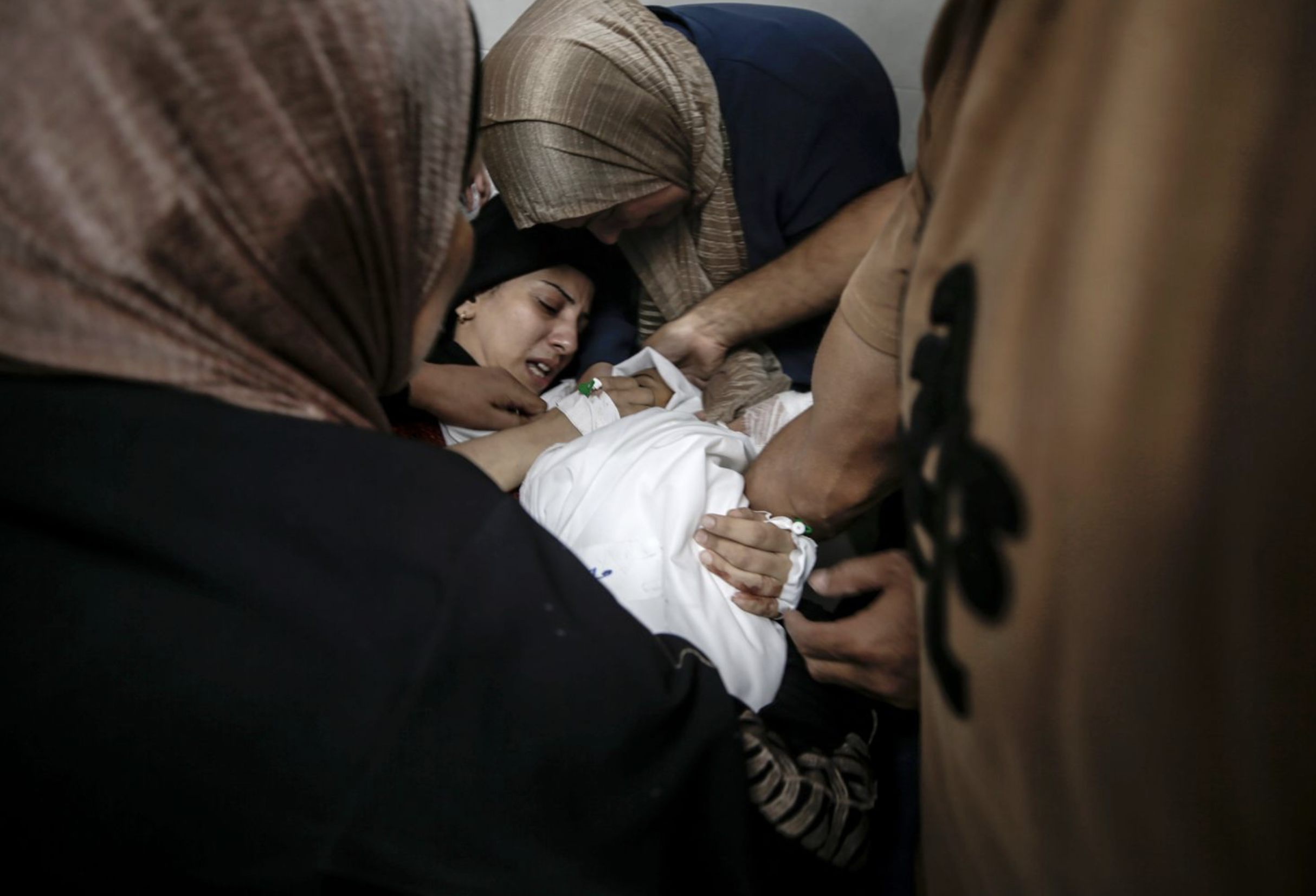
A woman mourns her dead daughter in a Gaza hospital, October 9, 2023. Photo: Haitham Imad / EPA
It's challenging to discuss men, especially in the Palestinian context. For a long time, Palestinian men have been dehumanized, and any association with them is often linked to terrorism, anti-Semitism, and barbarism. The media has contributed to this narrative by portraying Palestinian men as dangerous and savage.
In this context, women are also often seen as passive subjects rather than active agents. Additionally, there is a narrative that suggests Palestinian men oppress Palestinian women, while women are simultaneously oppressed and lack a voice. We're expected to protect them from their own patriarchal systems.
However, this is not the only reality. We love and respect our men as fathers, brothers, and husbands. They're not seen as a threat; they're seen as protectors. Similarly, the narratives surrounding Ukrainian men who defend their homeland are quite different. We see them as heroes, as expected to defend their country. The same is true for Palestinians, but they don't have the same means to do so.
When a man is unable to defend his homeland, he's often stripped of his masculinity. This is a traumatic experience for both men and women. And, of course, men in Palestine are also victims of genocide, just like women.
In recent months, there were many stories about Ukrainian ties to Israel, that Ukrainians have family ties to Israel, and that some Ukrainians died in Israel, and so on and so forth. But there were not many stories about Ukrainians in Gaza and Ukrainians in the West Bank, while there are officially 300 Ukrainians in Gaza, and more than 2000 Ukrainians in the West Bank. Can you please speak to that a little bit?
A lot of Jewish settlers actually came from Eastern Europe, including Poland, Ukraine and Russia. They came as actual settlers pledging aliyah to the Jewish state, got their passports and displaced native populations, which created many injustice and inequalities. It also established strong connections between Israeli society and Ukrainian one. So for many Ukrainians who have family, friends and colleagues in Israel, it's easier to sympathize with the thing that you know, over a thing that you don't know, you don't understand.
On the contrary, most of the Ukrainians living in the West Bank and Gaza are women who married Palestinian men and returned with them to Palestine. However, their stories are often overlooked because of a dominant narrative that portrays them as oppressed, having changed their religion, and therefore, their opinions don't carry much weight. There's a strong undercurrent of prejudice that suggests these women are brainwashed and don't have a valid perspective. So when a Ukrainian woman from Kharkiv loses her child in Gaza, it's reported as a statistic rather than a personal tragedy with a rich backstory. We don't get to know about her life, her love story with her husband, how she raised her children, or her experiences as a mother. The media fails to humanize these Ukrainian women in Palestinian communities, reducing them to mere statistics or simplistic representations.
Lastly, what do you think about the prospects of solidarity between Ukraine and Palestine?
In terms of the solidarity, what I think both people need to understand: it is such a difficult discussion for people in Palestine, or the Arab world in general, and for people in Ukraine, because our traumas come from very different places. For Ukrainians, the trauma is associated with the Soviet Union, with Russia, we're talking about Russian imperialism. For the Arab world, we're talking about Western-dominated imperialism, we're talking about NATO, we're talking about the Iraq war that is still a very fresh wound in recent Arab history. For me, speaking as a Palestinian Ukrainian, there's a lot of trauma from my mother's side, and there's a lot of trauma from my dad's side, but historically, they just don't meet because they come from two opposing forces, which have been at odds since the time of the Cold War. One has to be able to overlook that and see how individuals' lives are impacted - step aside, far away from thinking of geopolitics and just see the human aspect of it. This is the most important thing to consider when speaking of solidarity.
Let us consider Ireland, for example. The general public in Ireland has always shown support for Palestinians. I recently read an article about how the Irish can empathize with the suffering of Palestinians through the lens of their own experience with the Irish famine. They see similarities between the current man-made famine in Gaza and their own historical experience of famine caused by Britain.
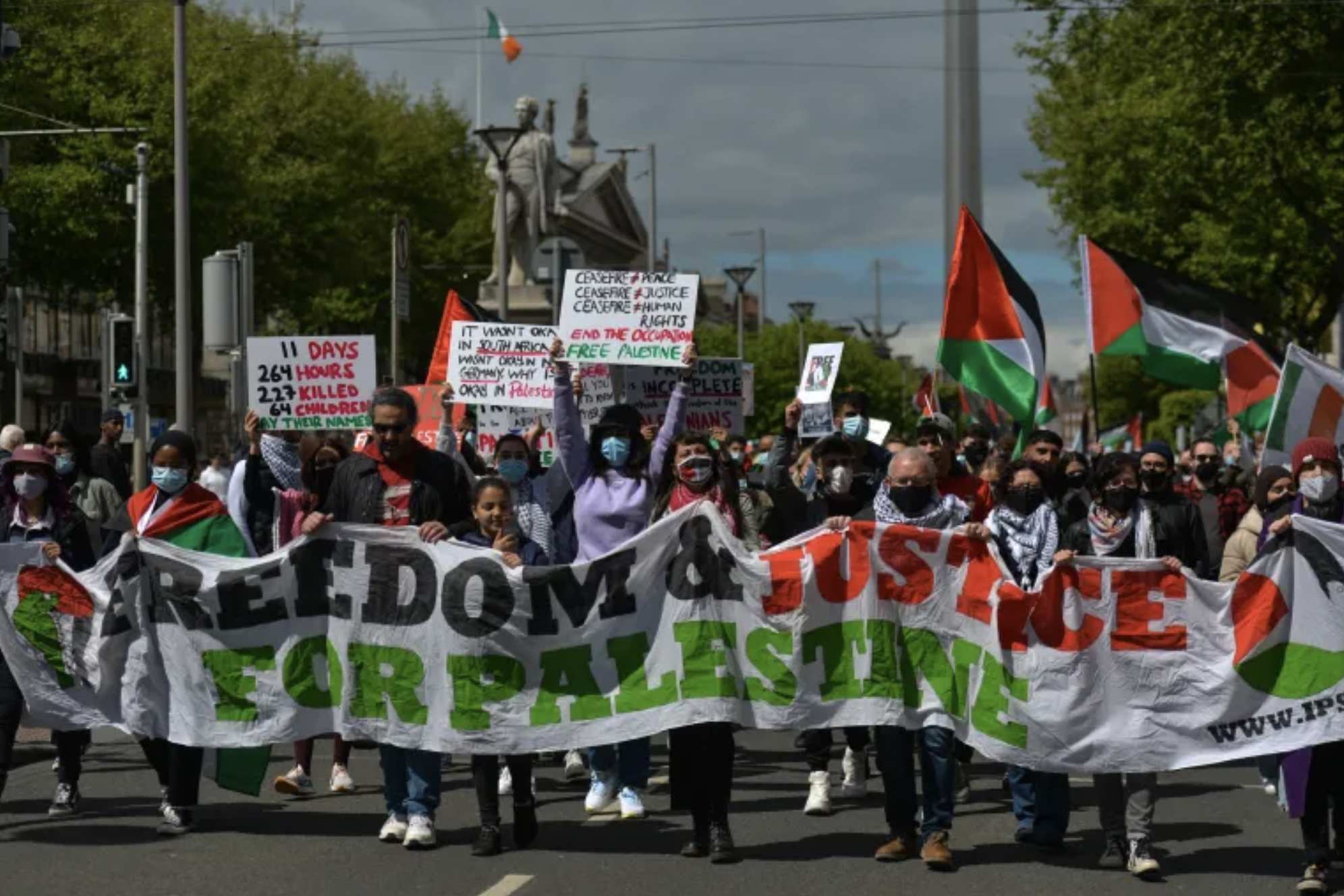
Pro-Palestinian protesters during a rally in support of Palestine, Dublin, Ireland, May 22, 2021. Photo: Artur Widak
Similarly, Ukrainians have also endured the Holodomor, a famine inflicted by the Soviet Union. I vividly remember my great-grandmother, who played a crucial role in my upbringing who often spoke about surviving the famine. It's a part of every Ukrainian's consciousness; our oldest generation lived through it.
It's crucial for us to draw these parallels or comparisons: Palestinians are currently facing not only genocide but also famine, echoing our own historical experience in Ukraine. Finding common ground between these stories is vital. However, bridging these historical traumas is challenging because they originate from ideologically opposing forces.
Do you believe in solidarity between Ukrainians and Palestinians in the future? Do you see some changes and ruptures that came with the recent genocide in Gaza?
I am not very hopeful about this, to be honest. Not in the near future at least. I don't think that the mainstream narratives are going to change. I think they will remain in place. And, in general, Europe is becoming more right-wing-ish, while Ukraine wants to be part of the European family. I think that with the prolonged war in Ukraine that we are witnessing now, we will see more examples of the limits of European solidarity. And that would make a lot of us, Ukrainians, think about the limits of such an alliance. Maybe that will help us to understand the importance of having alliances with the Global South.
But in general, I don't predict that a lot of changes will happen in the future on the side of the Arab world. For the older generation of Arabs, the Soviet Union, and by extension nowadays Russia remains a symbol of an anti-imperial project — an ideological concept deeply ingrained in their mindset. This perception is unlikely to diminish anytime soon. People in the Arab world have started learning about Ukraine more recently. It will take some time for people to be able to make that sort of a connection.
But I also believe that individual voices are also very important. I think that people are able to make changes, and discussions like these are very important. And I think that people like you and me, and lots of others, we need to make sure that whoever supports either of the wars, Russian war in Ukraine, or Israeli genocide, are confronted.We need to make these seemingly impossible solidarity connections, and bring awareness about what is happening in both countries.
